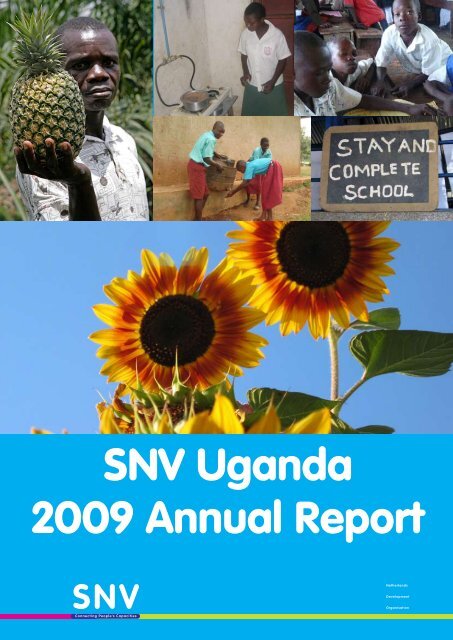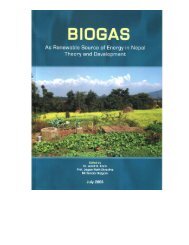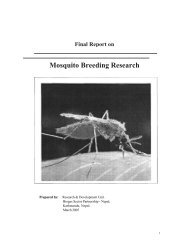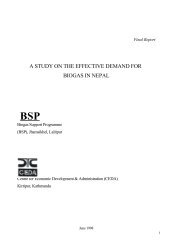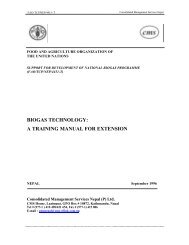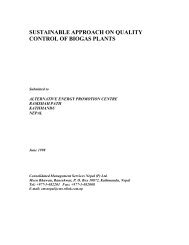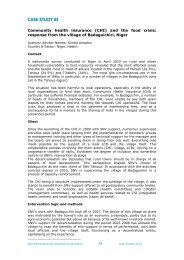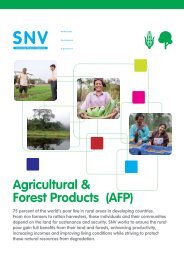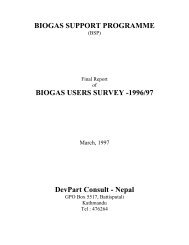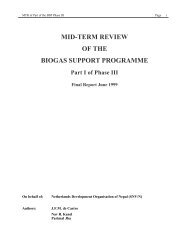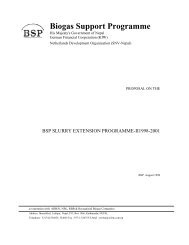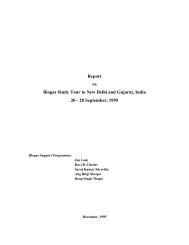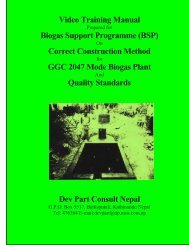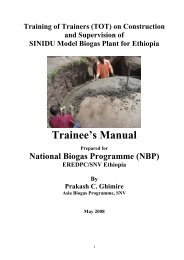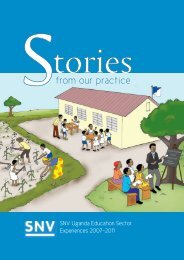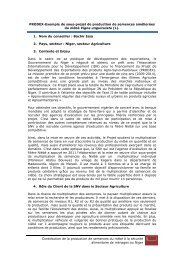SNV Uganda 2009 Annual Report
SNV Uganda 2009 Annual Report
SNV Uganda 2009 Annual Report
Create successful ePaper yourself
Turn your PDF publications into a flip-book with our unique Google optimized e-Paper software.
<strong>SNV</strong> <strong>Uganda</strong><br />
<strong>2009</strong> <strong>Annual</strong> <strong>Report</strong><br />
1
<strong>SNV</strong> gives you the knowledge and the power to improve what you are<br />
doing.<br />
<strong>SNV</strong> makes you love your work.<br />
This is better than money: the money will get finished very quickly, the<br />
knowledge and power will last always.<br />
Umaru Lubega, Mpigi District
From the Country Director<br />
I am pleased to present you with <strong>SNV</strong>’s annual report for <strong>2009</strong>. It gives an overview of our work,<br />
which is sharing expertise with <strong>Uganda</strong>n partners in finding and implementing sustainable solutions to<br />
development challenges.<br />
Our advisory services support international and <strong>Uganda</strong>n government policies; they are tailor-made for<br />
the specific district or organisation.<br />
Our overall aims are to contribute to:<br />
• effective delivery of good basic services in primary education; water, sanitation and hygiene;<br />
and renewable energy<br />
• sustainable, equitable production, income and employment for the economically active poor,<br />
focusing on oilseed, horticulture, honey and dairy.<br />
We are proud of our results in <strong>2009</strong>. We continue to work with even greater commitment towards the<br />
same goals in 2010. For 2010, we plan for the following:<br />
• increase our involvement in developing knowledge, in collaboration with <strong>Uganda</strong>n universities<br />
and international knowledge institutes like the International Water and Sanitation Centre<br />
(IRC) in the Triple S program —Sustainable Services at Scale.<br />
• start advisory work on developing vocational skills.<br />
• apply <strong>SNV</strong> expertise in <strong>Uganda</strong> borrowed from other countries in the East & Southern Africa<br />
region, especially in renewable energy and dairy.<br />
• increase the number of our advisory days that local capacity builders deliver.<br />
• place gender and ecological sustainability in the mainstream in all our advisory services.<br />
I want to thank you for your collaboration in <strong>2009</strong>, and I hope to meet with you soon, that we may<br />
strengthen our partnership.<br />
For now, I wish you good reading.<br />
Jeanette de Regt<br />
Country Director, <strong>SNV</strong> <strong>Uganda</strong><br />
1
About <strong>SNV</strong><br />
What is <strong>SNV</strong>?<br />
<strong>SNV</strong> is an international development organisation, created as a foundation in the Netherlands in 1963.<br />
We currently work in 32 countries, in Asia, Latin America and the Balkans, but mainly in Africa. <strong>SNV</strong><br />
started working in <strong>Uganda</strong> in 1989.<br />
Our mission<br />
<strong>SNV</strong> is dedicated to a society in which all people enjoy the freedom to pursue their own sustainable<br />
development. We contribute to this by strengthening the capacity of local organisations.<br />
What do we do?<br />
<strong>SNV</strong>’s core business is to provide advisory services. We give advice to national and local actors within<br />
government, civil society and the private sector to help them find and implement local solutions to social<br />
and economic development challenges.<br />
To further increase our relevance, effectiveness and efficiency we complement our advisory services with<br />
three additional delivery channels:<br />
• knowledge brokering<br />
• advocacy<br />
• support to establish funding mechanisms for local capacity development tailored to the needs<br />
of local actors<br />
Our people<br />
<strong>SNV</strong> employs more than 1200 staff worldwide. More than 70% of our advisors and 95% of our support<br />
staff come from countries in which we work. In <strong>Uganda</strong> we employ 42 advisors and 24 support staff.<br />
We work in teams with a diverse mix of professionals with varied expertise, and different cultural<br />
and professional backgrounds. Our advisors combine their thematic knowledge with skills in process<br />
facilitation, organizational development and institutional strengthening.<br />
Ownership and long-term sustainability of development processes are greatly served by strengthening<br />
the rising numbers of local capacity builders. That is why <strong>SNV</strong> advisory services are increasingly delivered<br />
by local capacity builders.<br />
2<br />
Planning for better services to our partners in Rwenzori
<strong>SNV</strong> in <strong>Uganda</strong><br />
In which sectors do we work?<br />
In <strong>Uganda</strong> we focus on<br />
• Primary Education<br />
• Water, Sanitation and Hygiene<br />
• Renewable Energy<br />
• Agriculture: value chain development in Oilseed, Horticulture, Honey and Dairy<br />
• New in 2010: Vocational Skills Development<br />
Good governance principles like accountability, transparency and participation are at the heart of all our<br />
work. ‘Governance for empowerment’ is the concept we use to underscore the value we place on gender<br />
equity and social inclusion of poor and marginalised people as the basis of sustainable development.<br />
Area Districts Sectors Staff (no.)<br />
Central portfolio<br />
Kiboga, Mpigi, Mukono,<br />
Lwuwero, Masaka, Rakai,<br />
Kampala<br />
Renewable energy,<br />
Agriculture,<br />
Education,<br />
WASH<br />
26<br />
North East portfolio<br />
Bukedea. Kapchorwa,<br />
Kumi, Lira, Mbale,<br />
Sironko, Soroti<br />
Agriculture,<br />
Education,<br />
WASH<br />
14<br />
Rwenzori portfolio<br />
Bundibugyo, Kabarole,<br />
Kamwenge, Kasese,<br />
Kyenjonjo<br />
Agriculture,<br />
Education,<br />
WASH<br />
13<br />
West Nile<br />
Adjumani, Arua, Moyo,<br />
Nebbi, Yumbe<br />
Agriculture,<br />
Education,<br />
WASH<br />
13<br />
Our partnerships<br />
We work as much as possible with other local, national and international organisations. Partnerships are<br />
an important way to improve the results of our advisory practice.<br />
We leverage aid provided by the government of the Netherlands, as well as by multilateral and bilateral<br />
partners.<br />
Partnerships with other development agencies and the private sector are key to our approach.<br />
Signing of the <strong>SNV</strong> - World Vision<br />
Education Partnership (<strong>2009</strong> -2012)<br />
3
Education<br />
Portfolio<br />
District governments we<br />
work with<br />
Other partners<br />
Central Kiboga, Mpigi, Rakai Link Community Development, Flora<br />
Family Foundation, Makerere University,<br />
Economic Policy and Research Centre,<br />
Oxford University<br />
North East<br />
Rwenzori<br />
Bukedea, Kapchorwa,<br />
Mbale, Soroti<br />
Bundibugyo, Kabarole,<br />
Kamwenge, Kasese,<br />
Kyenjojo<br />
World Vision International, <strong>Uganda</strong> Wildlife<br />
Authority, IUCN, Islamic University in<br />
<strong>Uganda</strong>, EDUKANS, Kapchorwa Civil<br />
Society Organisation<br />
World Vision, KRC, Save the Children,<br />
Pentecostal and Mountains of the Moon<br />
Universities, The United Nations Children’s<br />
Fund-(UNICEF), Bundibugyo NGO Forum,<br />
KADIVDO, KANCA<br />
West Nile Adjumani, Arua, Yumbe YODEO<br />
National level partners include World Vision <strong>Uganda</strong>, LINK, Embassy of the Kingdom of the Netherlands,<br />
MOES - [Ministry of Education & Sports], EDUKANS, IUCN – [World Conservation Union],<br />
KADIVDO – [Kamwenge District Indigenous Voluntary Organisations], KANCA – [Kabarole NGO and CBO<br />
Association], UNICEF – [United Nations Children’s Fund], YODEO – [Youth Development Organisation]<br />
We have greatly emphasised strengthening the structural systems mandated to deliver education services<br />
and we have worked specifically with district local governments and local civil society organisations to<br />
Group work in a primary school in Soroti<br />
4
ensure that their practices positively affect enrolment, retention and<br />
quality of education services.<br />
“With this knowledge,<br />
my wish is that illiteracy<br />
The <strong>Uganda</strong> Constitution (1995) stipulates education as a right for all stops with me“, SMC<br />
and subscribes to both the Education for All goal and the Millennium member Yumbe<br />
Development Goals. Actually realising these goals, though, is still<br />
uncertain. In many districts access to primary education and the<br />
quality of it are hindered by high pupil and teacher absenteeism,<br />
gender disparity in completing the education, inadequate infrastructure and human resource issues.<br />
Underpinning all these structural challenges are issues of accountability, transparency and efficient use<br />
of resources.<br />
<strong>SNV</strong> <strong>Uganda</strong>’s support to primary education aims to<br />
• increase enrolment and retention, especially of girls, in primary schools<br />
• improve the quality of service provided to promote holistic learning<br />
To achieve these aims, <strong>SNV</strong> initiated forums that brought all major players together to identify issues,<br />
seek solutions, manage them with the aim of improving coordination and collaboration, and ultimately<br />
promote efficiency and transparency.<br />
Throughout the year, a number of districts addressed district-specific issues:<br />
In Mpigi District, parents volunteered to mobilise fellow parents to send children to school and support<br />
them to complete primary 7, while in Kiboga District, functional adult literacy was introduced for parents<br />
so that they would learn to read and write and could then help their children with their homework.<br />
Radio programmes were used to mobilise community support for universal primary education.<br />
Further positive outcomes noted from these meetings<br />
include the favourable environment created for all<br />
parties to harness their roles and responsibilities.<br />
Leaders in districts, sub counties and schools strove to<br />
“<strong>SNV</strong> has shown us the way! Now,<br />
we can take up our responsibility<br />
create innovative strategies to improve service delivery.<br />
to improve the efficiency and<br />
Support to school management committees resulted in effectiveness of primary education<br />
better handling of school affairs. Most have instituted in our district,” District Education<br />
mechanisms for improving school affairs and monitoring<br />
Officer, Kyenjojo District.<br />
pupil learning. In Rakai, 25% of schools now have<br />
school feeding programmes as a result of active school<br />
management committees. In Kyenjojo, teacher and pupil<br />
absenteeism decreased by 50% while in Rwenzori, rates of completing primary school improved from<br />
35.6% in 2007 to 51.5% in 2008.<br />
In Kiboga, the district education officer invites head teachers for peer- to-peer support in charting<br />
improved teaching and management practices for the district. This participatory approach has resulted<br />
in improved management at all education levels in the district. Improved collaboration among head<br />
teachers has improved the sharing of resources and has motivated teachers. By the end of <strong>2009</strong>, Kiboga<br />
registered that 90% of teachers had attended the beginning of the term compared with only 50% at the<br />
beginning of <strong>2009</strong>.<br />
In Bundibugyo, the district education officer met with others to agree on an education road map for the<br />
district, providing a framework for collaboration and investments and stipulating interventions that would<br />
promote education for all.<br />
The accuracy of available data to enable proper planning and decision making continues to be a challenge<br />
5
within the sector. This situation makes it difficult to distribute resources equitably. <strong>SNV</strong> supported district<br />
leadership to improve the way data was collected and used in schools and the districts. A tool for realtime<br />
tracking of pupil and teacher absenteeism to curb wastage in the sector is being piloted in Mbale<br />
and Kiboga districts. Increasing the presence of teachers and pupils in the classroom will improve the<br />
quality of teaching and of learning.<br />
In Kamwenge, a ‘School Is Fun’ project initiated through partnership between <strong>SNV</strong>, the local district<br />
government and Hima Cement aims to promote enrolment by creating a child-friendly school environment<br />
using sports.<br />
‘We would like to do more with subjects like physical education and sports, arts and<br />
crafts, and music but we have no teachers for these subjects because of the teacher<br />
ceiling, and in the end our school is judged on how we perform in the Primary Leaving<br />
Examinations [PLE] subjects.’ Head Teacher Kiboga<br />
In 2010, <strong>SNV</strong> will continue to support existing government programmes while exploring innovative<br />
channels in providing quality education. Focus will be on<br />
• improving accountability and efficiency of service delivery<br />
• addressing equity issues, especially concerning the girl child<br />
• strengthening the voice and participation of communities to increase demand for providing quality<br />
services<br />
Campaign to promote pupil retention in Primary Schools in Eastern <strong>Uganda</strong><br />
6
Water, Sanitation and Hygiene<br />
Portfolio<br />
District local governments<br />
with whom we work<br />
Other partners<br />
Central Kiboga, Mpigi, Rakai Directorate of Water Development, MoWE.<br />
<strong>Uganda</strong> Wildlife Authority, UWASNET<br />
North East<br />
Rwenzori<br />
West Nile<br />
Kapchorwa, Kumi, Mbale,<br />
Soroti<br />
Bundibugyo, Kabarole,<br />
Kamwenge, Kasese, Kyenjojo<br />
Adjumani, Arua, Koboko,<br />
Yumbe<br />
Busiu Development Foundation, Islamic<br />
University in <strong>Uganda</strong>, Sebei Diocese, <strong>Uganda</strong><br />
Wildlife Authority<br />
Kabarole School of Clinical Officers, Health<br />
through Water and Sanitation (HEWASA),<br />
Kasese hand pump mechanics, Kyenjojo hand<br />
pump mechanics, PROTOS, Rwenzori African<br />
Development Foundation (RADF), Sustainable<br />
Sanitation and Water Renewal Systems<br />
(SSWARS), When Rains Fail (WHRAF)<br />
Participatory Rural Development Agency<br />
(PARUDA), Youth Development Organisation<br />
(YODEO)<br />
National level partners include Belgian Technical Cooperation, CARE <strong>Uganda</strong>, IRC-[International Water<br />
and Sanitation Centre], NETWAS <strong>Uganda</strong>- [The Network for Water and Sanitation], PROTOS, UN-<br />
HABITAT [United Nations Human Settlements Programme],<br />
MoWE – [Ministry of Water and Environment of <strong>Uganda</strong>], PARUDA, RADF, UWASNET – [<strong>Uganda</strong> Water and<br />
Sanitation NGO Network], YODEO<br />
7
Fundamental to sustainable development is access to safe water and improved sanitation in schools<br />
and households. <strong>Uganda</strong> currently reports access to safe water at 65% in rural areas and 66% in urban<br />
areas. Enormous efforts have been made to improve rural people’s access to water supplies. However,<br />
the increasing population growth, the rising per capita costs of technologies, the degradation of water<br />
resources, and the continuous use and promotion of conventional technologies hinder significant progress.<br />
Sanitation coverage stands at a national average of only 68% with major disparities in the rural areas.<br />
<strong>SNV</strong>’s support in this sector aims to<br />
• improve functionality of water points by supporting good management and maintenance<br />
• improve planning, accountability, transparency and equitable allocation of resources by promoting<br />
collaboration and coordination<br />
Emphasis was placed on improving hygiene and sanitation practices in communities and primary schools—<br />
especially for the girl child. Absence of toilets and water is an important reason why girls who start<br />
menstruating drop out of school. Learning platforms have been initiated in Arua, Kamwenge, Koboko<br />
and Kyenjojo. At these platforms, experiences are shared and joint action plans undertaken in regard to<br />
policy and practice on hygiene and sanitation in households and schools. This has resulted in<br />
• improved coordination between stakeholders and harmonisation of approaches in districts and sub<br />
counties<br />
• improved hygiene and sanitation practices in schools and communities<br />
• increased participation by various stakeholders including those in the private sector<br />
• improved transparency and accountability as stakeholders freely ask questions regarding expenditure<br />
of resources<br />
To overcome the problems of unstable soils and high groundwater tables, <strong>SNV</strong> promoted ecological<br />
sanitation technology in Kapchorwa, Kiboga, Kumi Mbale, Mpigi, Rakai and Soroti. Ecological sanitation<br />
is a concept of recycling the valuable nutrients contained in human urine and faecal matter back into<br />
agriculture. <strong>SNV</strong> actively promotes this technology through regional exposure visits and district-initiated<br />
learning platforms. Consequently, these efforts have led to improved sanitation facilities in many<br />
schools.<br />
In <strong>2009</strong>, we worked with various partners in these districts to promote efficient and effective practices<br />
and technologies. Rainwater harvesting is one affordable technology that households have adopted.<br />
Koboko Town Council, for instance, constructed two tanks at their offices that benefited 250 people within<br />
the vicinity. Additionally, women working with masons participated in constructing these tanks. By the<br />
end of <strong>2009</strong>, 48 households owned rainwater harvesting tanks.<br />
In 2010, efforts are geared towards improving sector collaboration and coordination at the national<br />
level, as well as continuously supporting government’s national strategy for integrated water resource<br />
management.<br />
8
Renewable energy<br />
A student prepares a meal using a biogas stove<br />
After the biogas stove was introduced, Nalweyiso, a girl child attending nursing aid school, said, ‘I now<br />
prepare breakfast for the family on biogas and it is so fast that we have breakfast early and I no longer<br />
report late to school. I can also do some other household chores while cooking and even allow my siblings<br />
to prepare meals.’<br />
Biogas technology has been in <strong>Uganda</strong> for half a century but has not been widely adopted because of the<br />
high cost of the initial investment and inadequate coordination and collaboration among those involved<br />
in promoting the technology. Even more critical in deterring acceptance is the fact that <strong>Uganda</strong>ns rely<br />
on fuelwood and charcoal for cooking and use kerosene for lighting. Both fuelwood and kerosene are<br />
hazardous as they pollute the environment and aggravate respiratory and eye infections.<br />
In March <strong>2009</strong>, <strong>SNV</strong> <strong>Uganda</strong> under the African Biogas Partnership Programme, in partnership with HIVOS,<br />
Netherlands Directorate General of Development Cooperation (DGIS) and Heifer International, ventured<br />
into promotion of renewable energy. The programme focuses on improving access to and use of clean<br />
renewable sources of energy by<br />
• supporting the development and dissemination of domestic biogas in rural and peri-urban areas<br />
• contributing to the establishment of a sustainable and commercially viable biogas sector in the<br />
country<br />
9
By the end of <strong>2009</strong>, 43 masons had been trained in biogas construction; they then helped at least<br />
42 households gain access to affordable, clean, renewable energy. These trained service providers<br />
constructed 6-m³ size digesters, used mainly for cooking and lighting.<br />
Using domestic biogas cuts down on fuelwood consumption and on the time and effort spent collecting<br />
firewood—a chore done by women and children. As a result, women can now participate in community<br />
programmes, while girl children can spend more time in educational activities. In 2010 we will step up<br />
our efforts, together with partners, to roll out the programme to households in <strong>Uganda</strong> for cooking,<br />
lighting and increase in farm productivity.<br />
Lighting up a house with a biogas lamp<br />
Partners<br />
Heifer International <strong>Uganda</strong><br />
HIVOS- (Humanist Institute for International Development Co-operation)<br />
DGIS - (General Directorate of Development Co-operation)<br />
Ministry of Energy and Mineral Development<br />
10
Agriculture<br />
Some 80% of <strong>Uganda</strong>’s population is dependent on agriculture, making it an important and viable<br />
tool for reducing poverty. <strong>SNV</strong>’s advisory services therefore focus on increased production, income and<br />
employment in the agriculture, livestock, oilseed, beekeeping and horticulture sectors.<br />
In <strong>2009</strong>, working with various farmer groups and other partners, <strong>SNV</strong> realised improvement in<br />
• relationships among producers, processors and other actors<br />
• greater inclusion and participation of farmers in economic affairs<br />
• improved women’s decision-making power at household level<br />
• greater benefits for farmers<br />
• more partnerships for funding and technical assistance.<br />
<strong>SNV</strong> is one of the Dutch NGOs, finance agencies and knowledge institutes united under Agri- ProFocus<br />
(APF) with an aim of enhancing farmer entrepreneurship in <strong>Uganda</strong>. <strong>SNV</strong> coordinates the APF country focus<br />
process in <strong>Uganda</strong> with support from the APF secretariat and Wageningen University. A coordination group<br />
with the team leaders of all action groups complemented by <strong>SNV</strong> <strong>Uganda</strong> and the support organisations<br />
is in place.<br />
Working in partnership with The International Fund for Agricultural Development (IFAD) through the<br />
Strengthening Support Capacity for Enhanced Markets Access and Knowledge Management (SCAPEMA),<br />
<strong>SNV</strong> contributed to<br />
• improved market access through farmer groups using market information systems in 19 rural<br />
information centres.<br />
• knowledge sharing among farmers through exchange visits and policy dialogues<br />
• increased productivity as a result of farmers gaining tips on good farming practices, packaging and<br />
marketing of their produce<br />
Horticulture<br />
Portfolio<br />
Central<br />
Rwenzori<br />
District local governments with<br />
whom we work<br />
Kayunga, Luwero, Masaka, Mityana,<br />
Mubende<br />
Kabarole, Kamwenge, Kasese,<br />
Kyenjojo<br />
Other partners<br />
Luwero District Farmers’ Association,<br />
Centenary Bank<br />
Private Sector Development and Consultancy<br />
Centre (PRICON), Kyembogo Farmers’<br />
Association (KYEFA), KIIMA Foods, The<br />
National Agricultural Advisory Services<br />
(NAADS) program of <strong>Uganda</strong><br />
National partners: Agriterra, Britannia Allied Industries, Danish International Development Assistance<br />
(Danida), the Agriculture Support Programme (ASPS), Technoserve, PUM– [Netherlands senior experts],<br />
SEAF– [Small Enterprise Assistance Funds], UNBS-<strong>Uganda</strong> National Bureau of Standard, KIIMA, NAADS<br />
Within the horticulture value chain, pineapple farming has untapped potential in regional markets with<br />
everyone benefiting, especially the small producers. <strong>SNV</strong> works with pineapple-growing groups to<br />
implement good practices that lead to increased yields and incomes. Our overall focus is on improving<br />
competitiveness of all involved in the value chain. One such initiative is the forum that brings together<br />
stakeholders to address key issues and develop joint action plans on<br />
• good agricultural practices like how to manage wilt disease<br />
• availability of inputs<br />
• access to markets<br />
• adoption of useful new technologies<br />
• policies<br />
11
In <strong>2009</strong>, pineapples within the Rwenzori region<br />
were attacked by pineapple wilt, a disease unknown<br />
to local farmers. This issue was tackled through an<br />
<strong>SNV</strong>-initiated platform that brings together farmers,<br />
researchers, education institutions, businessmen<br />
and government organisations like the National<br />
Agricultural Research Organisation (NARO).<br />
Immediately, researchers were able to take samples<br />
of the affected pineapples, test them and come up<br />
with possible solutions. The wilt remains a challenge.<br />
Efforts are being made nationally to understand it<br />
and to make farm-based trials to contain its spread.<br />
Today, a pineapple production guide stipulating good agricultural<br />
practices has been developed in English and farmers in Rwenzori and<br />
Luwero districts are currently using it. The next step is to translate<br />
this guide into Runyakitara, Luganda and other local languages of pineapple-growing communities.<br />
In 2010, <strong>SNV</strong> commits to further enhance collaboration within this sector by seeking more partnerships<br />
to address sector challenges including the wilt disease, strengthening of producer groups, linking input<br />
suppliers to farmer groups in-order to provide timely and adequate supply of inputs, links to markets and<br />
formation of strong value chains to lobby for favourable policies.<br />
Oilseed<br />
Portfolio<br />
North East<br />
District local governments with<br />
whom we work<br />
Bukedea, Kapchorwa, Kumi, Lira,<br />
Mbale, Soroti<br />
Other partners<br />
Popular Kumi Women’s Initiative,<br />
Vredeseilanden Coopibo (VeCO) <strong>Uganda</strong><br />
Islamic University in <strong>Uganda</strong>, <strong>Uganda</strong><br />
Wildlife Authority, Mukwano<br />
Rwenzori Bundibugyo, Kasese Nyakatonzi Growers Cooperative Union,<br />
Karughe<br />
West Nile<br />
Adjumani, Arua, Moyo, Nebbi,<br />
Yumbe<br />
National partners: <strong>Uganda</strong> Oilseed Producers and Processors Association, VODP-[Vegetable Oil<br />
Development Project], IFAD, VECO, NAADS, Mukwano<br />
In the oilseed sector, <strong>SNV</strong> works within 13 districts to enhance production and marketing. During the last<br />
season in <strong>2009</strong>, the production volume and incomes of oilseed increased by approximately 20%. These<br />
figures confirm the entry of new participants in the sector, from households to donors and private sector<br />
organisations and increased collaboration through the Oilseed Sub-sector Platform.<br />
The Oilseed Sub-sector Platform emerged out of a need identified by oilseed stakeholders,<br />
particularly those in the sunflower value chain, and by <strong>SNV</strong> <strong>Uganda</strong>. The platform comprises<br />
different private and public actors whose common interest is to enhance coordination.<br />
Aware of the need to act with one voice to influence policies and attract public and donor<br />
support, in <strong>2009</strong> the members organised a strategic meeting to advocate coherent sectorspecific<br />
policy and legislation. Three key areas were identified during this event:<br />
12
•<br />
•<br />
•<br />
increase access to adequate quality planting seed<br />
build capacity of farmer groups to bulk<br />
encourage innovative capacity and technological upgrading<br />
The State Minister for the Ministry of Agriculture,<br />
Animal Industries and Fisheries (MAAIF), Mr. Henry<br />
Aggrey Bagiire, who affirmed the importance of this<br />
strategic dialogue, attended the policy dialogue.<br />
“The strategic dialogue organized by OSSUP is a<br />
good opportunity to link public and private sector in<br />
this joint effort and to push the government policy,<br />
Prosperity for All, to greater heights,” he said.<br />
13
Non-timber forest products<br />
Portfolio<br />
North East<br />
Rwenzori<br />
West Nile<br />
District local governments with whom<br />
we work<br />
Bukedea, Kapchorwa, Kumi, Mbale,<br />
Sironko, Soroti<br />
Bundibugyo, Kabarole, Kamwenge,<br />
Kasese, Kyenjojo<br />
Arua, Moyo, Nebbi, Yumbe<br />
Other partners<br />
Mt Elgon Beekeeping, Soroti Diocese<br />
Catholic Integrated, Soroti DLG,<br />
<strong>Uganda</strong> Wildlife Authority, VECO<br />
Kamwenge Beekeepers Cooperative<br />
Society, Kabarole Beekeepers’<br />
Association, BBC, Hives Save Lives<br />
National partners: Ministry of Agriculture, <strong>Uganda</strong> Export Promotion Board, Apitrade Africa, <strong>Uganda</strong><br />
National Apiculture Development Organisation (TUNADO), VECO<br />
Government through its programmes like the Plan for Modernisation of Agriculture and the Zoning<br />
for Agricultural Production Program recognises apiculture as a viable enterprise. Apiculture plays an<br />
important role in food security and biodiversity conservation. Though the sector produces more for<br />
informal domestic markets, <strong>Uganda</strong>’s honey has qualified for access to niche markets like the European<br />
Union.<br />
In apiculture, <strong>SNV</strong> seeks to improve beekeeping practices to achieve sustained production. Such<br />
improvement will lead to access to formal markets and will result in sustained incomes and better<br />
living standards. Our focus remains to improve efficiency by all those involved and will improve sector<br />
coordination and collaboration.<br />
With <strong>SNV</strong> support, hive colonisation rates have improved dramatically, increasing the viability of this<br />
enterprise and attracting financing from private sector organisations like Centenary Bank, Kilimo Trust<br />
and Hives Save Lives.<br />
In Rwenzori, a beekeepers’ competition organised by <strong>SNV</strong> attracted over 200<br />
participants. The event motivated many farmers and attracted private sector players.<br />
It has now become an annual event for mobilising and promoting actors within the<br />
value chain. In Moyo, the Moyo Beekeepers Association has seen its membership grow<br />
to 198 farmers, leading to increased production (8 metric tons) and higher profits.<br />
14<br />
Taking honey to the market
Dairy<br />
Exploring opportunities in the dairy sector<br />
Approximately 2.5 million households in about 42 districts (2007 statistics) lie in the cattle corridor<br />
and rely on livestock farming. Therefore, the government selected dairy as one of the seven priority<br />
subsectors in the Plan for Modernisation of Agriculture.<br />
This sector is however faced with many setbacks like low milk yields, poorly organised farmer organisations,<br />
poor infrastructure, poor industry coordination and lack of an enabling environment.<br />
<strong>SNV</strong> <strong>Uganda</strong> together with other stakeholders including the Dairy Development Authority initiated a<br />
platform to bring all interested parties to dialogue, foster working relations and replicate good practices<br />
from experiences within the region, like the business hub model.<br />
In 2010, opportunities will be explored to link the dairy value chain with the renewable energy and<br />
oilseed value chains. More partnerships, both within civil society and the private sector, will be sought as<br />
we continue to address emerging issues.<br />
15
Financial overview<br />
In <strong>2009</strong>, our operational budget was €3.4 million representing the advisory contribution of our 66<br />
permanent staff and local capacity builders.<br />
<strong>SNV</strong> UGANDA <strong>2009</strong> EXPENDITURE PER SECTOR<br />
17%<br />
26%<br />
13%<br />
13%<br />
23%<br />
5%<br />
2%<br />
1%<br />
PRIMARY EDUCATION 26%<br />
WATER & SANITATION 23%<br />
RENEWABLE ENERGY/BIOGAS 1%<br />
DAIRY 2%<br />
OIL SEEDS 13%<br />
HORTICULTURE 5%<br />
NON TIMBER FOREST PRODUCTS 13%<br />
OTHER 17%<br />
16
<strong>SNV</strong> <strong>Uganda</strong> team<br />
Country Office<br />
Plot 36, Luthuli Rise, Bugolobi<br />
P.O. Box 8339 Kampala, <strong>Uganda</strong><br />
Tel: +256 31 226 0057/8<br />
Fax: +256 31 226 0060<br />
Email: uganda@snvworld.org<br />
www.snvworld.org<br />
Jeanette de Regt, Country Director<br />
Flavia Serebe, Logistics Officer<br />
Cathy Kemigisha, Administrative Assistant<br />
Priscilla Nabanja, Management Assistant<br />
Doreen Kirungi, Human Resource Officer<br />
Apollo Muyanja, Partnership & Resource Mobilisation Advisor<br />
Peninah Kembabazi, Driver<br />
Calvin Mugerwa, Office Attendant<br />
SCAPEMA- IFAD<br />
Prossie V. Musoke, Regional SCAPEMA Representative<br />
Anne Turinayo, Knowledge Management Consultant<br />
Regional team<br />
Reuben M. Coffie, Regional Investment Coordinator<br />
Obuobi Richard, Regional Investment Advisor<br />
Central Portfolio<br />
Plot 32, Luthuli Rise, Bugolobi<br />
Kampala, <strong>Uganda</strong><br />
Tel: +256 41 456 3250<br />
Anne M. Mutta, Portfolio Coordinator<br />
Kees de Graaf, Education Advisor<br />
Ketrah Mukone, Finance & Administration Officer<br />
James Mwai, Agriculture Sector Head<br />
Aldo Hope, Agriculture Sector Advisor<br />
Robert O. Nyambaka, Agriculture Sector Advisor<br />
Patience Turyareeba, Renewable Energy Advisor<br />
Annette Kakwera, Administrative Assistant<br />
Peace Kansiime, Renewable Energy Advisor<br />
Damalie Zalwango, Education Advisor<br />
Helen Mwase, Water, Sanitation & Hygiene (WaSH) Advisor<br />
Ivan Tumuhimbise, Agriculture Sector Advisor<br />
Bernard Eyadu, Water, Sanitation & Hygiene (WaSH) Advisor<br />
Henry K. Kimera, Education Advisor<br />
Eric Agaba, Driver<br />
Daniel Magoma, Driver<br />
Lubega Umaru, Driver<br />
Minsusera Walusimbi, Driver<br />
A. Chemisto Satya, Water, Sanitation & Hygiene (WaSH) Sector Head<br />
Warren Musinguzi, Office Attendant<br />
17
North East Portfolio<br />
Plot 11, Wanale Road<br />
Mbale, <strong>Uganda</strong><br />
Tel: +256 35 226 0050/1<br />
Joseph Semujju, Portfolio Coordinator<br />
Duncan Mwesige, Agriculture Sector Advisor<br />
Susan Karungi, Education Advisor<br />
Annette Kawooya-Bogere, Agriculture Sector Advisor<br />
Esther Byakika, Finance & Administration Officer<br />
Edward Kamoga, Agriculture Sector Advisor<br />
Peter O. Okaje, Agriculture Sector Advisor<br />
Wilbrord Turimaso, Water, Sanitation & Hygiene (WaSH) Advisor<br />
Milton Wataba, Driver<br />
Samuel Ekuma, Driver<br />
Arthur Mbuusi, Driver<br />
Samuel Musinguzi, Finance & Administration Officer<br />
Els Heijnen-Maathuis, Education Sector Head<br />
Deborah Nabirye, Office Attendant<br />
Rwenzori Portfolio<br />
Kakiiza Road<br />
P.O. Box 78, Fort Portal<br />
Tel: +256 75 820 0778, +256 48 342 2777<br />
Fax: +256 31 226 0060<br />
Felix Kazahura, Portfolio Coordinator<br />
Marieke van Schie, Agriculture Sector Advisor<br />
Dick Bangizi, Education Advisor<br />
Jacinta N. Nekesa, Water, Sanitation & Hygiene (WaSH) Advisor<br />
Edward Makobore, Agriculture Sector Advisor<br />
Lucy Musana, Finance & Administration Officer<br />
Godfrey Wabwire, Education Advisor<br />
David Kasaija, Driver<br />
Stephen Kisembo, Driver<br />
Hannington Ssebaduka, Agriculture Sector Advisor<br />
Paschal Isingoma, Driver<br />
Lillian Nabasirye, Water, Sanitation & Hygiene (WaSH) Advisor<br />
Mary Nyangoma Amooti, Office Attendant<br />
Stella Tugume, Administrative Assistant<br />
18
West Nile Portfolio<br />
Plot 2, Ociba Lane<br />
Arua, <strong>Uganda</strong><br />
Tel: +256 47 642 0623, +256 77 220 0781<br />
Gregory Acar, Portfolio Coordinator<br />
P. Ssonko Kivumbi, Education Advisor<br />
Susan Atai, Administrative Assistant<br />
Rashidah Kulanyi, Water, Sanitation & Hygiene (WaSH) Advisor<br />
Brecht.A. Mommen, Water, Sanitation & Hygiene (WaSH) Advisor<br />
Anthony Agaba, Agriculture Sector Advisor<br />
D. Sengozi Kyeyune, Agriculture Sector Advisor<br />
Joseph Akol, Education Advisor<br />
Solomon Oyo, Finance & Administration Officer<br />
Andrew Opila, Driver<br />
Charles Chandiga, Driver<br />
James Amoru, Driver<br />
Zakariah Kasirye, Education Advisor<br />
Christine Bako, Office Attendant<br />
19
The <strong>Uganda</strong> Districts where we are working<br />
YUMBE<br />
Arua<br />
ARUA<br />
Ora<br />
NEBBI<br />
MOYO<br />
Albert Nile<br />
ADJUMA N I<br />
Victoria Nile<br />
Kitgum<br />
Aringo<br />
K ITGUM<br />
Acuwa<br />
Page<br />
LIRA<br />
Agago<br />
(Moroto<br />
OkokDopeth<br />
Oker<br />
Lake<br />
Edward<br />
Semliki<br />
Kasese<br />
Fort<br />
Portal<br />
BUNDIBUGYO<br />
KASESE<br />
L. George<br />
Kazinga<br />
Channel<br />
KABAROLE<br />
KYENJOJO<br />
KAMWENGE<br />
Lake Albert<br />
Nkusi<br />
Masaka<br />
Kafu<br />
KIBOGA<br />
Katon g a<br />
MPIGI<br />
MASAKA<br />
Lugo<br />
Lake<br />
Kwania<br />
LUWERO<br />
Bombo<br />
Kampala<br />
WAKISO<br />
Victoria Nil e<br />
MUKONO<br />
L. Bisina<br />
SOROTI<br />
Lake Kyoga<br />
SIRONKO<br />
KUMI<br />
KAPCHORWA<br />
PALLISA<br />
Mbale<br />
MBALE<br />
RAKAI<br />
S e s e Is.<br />
KALANGALA<br />
Lake Victor i a<br />
20
List Of Abbreviations<br />
BTC<br />
CABCS<br />
DANIDA/ASPS<br />
DLG<br />
FORUD<br />
HEWASA<br />
HIVOS<br />
IRC<br />
IUCN<br />
JESE<br />
KABECOS<br />
KADIVDO<br />
KANCA<br />
KFEWPA<br />
KRC<br />
KYEFA<br />
KYEFA<br />
MoWE<br />
NAADS<br />
NARO<br />
NETWAS<br />
NGCU<br />
PARUDA<br />
PLE<br />
PRICON<br />
RADF<br />
SATNET<br />
SEAF<br />
SSS<br />
SSWARS<br />
TUNADO<br />
UNBS<br />
UNHABITAT<br />
UNICEF<br />
UWASNET<br />
VECO<br />
VODP<br />
WASH<br />
WHRAF<br />
YODEO<br />
Belgian technical cooperation<br />
Community Agribusiness Capacity Services<br />
Danish International Development Assistance/the Agriculture Support Programme<br />
District Local Government<br />
Foundation for Rural Development<br />
Health through water and sanitation<br />
Humanist Institute for Development Cooperation<br />
International Water and Sanitation Centre<br />
World Conservation Union<br />
Joint Effort to Save the Environment<br />
Kamwenge Beekeepers Cooperative Society<br />
Kamwenge District Volunteer Development Organisation<br />
Kabarole NGOs/CBOs Association<br />
Kyempara Farmers Environment and Wildlife<br />
Kabarole Research Center<br />
Kyembogo Farmers Association<br />
Kyembogo Farmers Association<br />
Ministry of Water and Environment of <strong>Uganda</strong><br />
National Agricultural Advisory Services<br />
National Agricultural Research Organisation<br />
The Network for Water and Sanitation<br />
Nyakatonzi Growers Cooperative Union Ltd<br />
Participatory Rural Development Agency<br />
Primary Leaving Examinations<br />
Private Sector Development and Consultancy Centre<br />
Rwenzori African development foundation<br />
Sustainable Agriculture Trainers Network<br />
Small Enterprise Assistance Funds<br />
Triple S program —Sustainable Services at Scale<br />
Sustainable Sanitation and Water Renewal Systems<br />
<strong>Uganda</strong> National Apiculture development Organization<br />
<strong>Uganda</strong> National Bureau of Standard<br />
United Nations Human Settlements Programme<br />
United Nations Children’s Fund,<br />
<strong>Uganda</strong> Water and Sanitation NGO Network<br />
Vredeseilanden Coopibo<br />
Vegetable Oil Development Project<br />
Water, Sanitation and Hygiene<br />
When Rains Fail<br />
Youth Development Organisation
22<br />
www.snvworld.org


